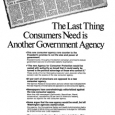Financial Regulation
Commentary
Why #OccupyWallStreet?
History Repeats Itself on Financial Reform
Cry Wolf Quotes
We feel that it is not in the public interest to require any and all information respecting the business of any bank be made a public record, and ask that the banks be required to submit information to the Federal Reserve Board only that such information be given confidential status, subject to the discretion of the Federal Reserve Board.
This one-size-fits-all approach would distract directors from managing a company, lessen shareholders voice in proposals and director elections, and continue to disenfranchise retail shareholders.
The real worry is that these new rules and regulations do not create a risk factor or a timidity that is so severe that... they sit on the sidelines worrying more about rules and regulations than they do about making money.
Recently, Washington has been great at issuing overly complex and ineffective regulations—breeding uncertainty among America’s job creators and stifl ing their ability to grow the economy. To add insult to injury, Congress and the administration are considering myriad new regulations to pile on top of business owners, threatening to make it even harder to keep their doors open.
Related Laws and Rules
Backgrounders & Briefs
Industry Repeats Itself on Financial Reform
As the nation approaches the first anniversary of the Dodd-Frank financial reform law, opponents are claiming that the new measure is extraordinarily damaging, especially to Main Street. But industry’s alarmist rhetoric bears striking resemblance to the last time it faced sweeping new safeguards: during the New Deal reforms. The parallels between the language used both then and now are detailed in a report released today by Public Citizen and the Cry Wolf Project.
Resources
Political Economy Research Institute is a think tank focused on a variety of subjects such as diverse financial regulation, living wages and environmental protection.
Consumer Federation of America defends the consumer interest in fields ranging from housing and financial services to food safety.
The Service Employees International Union represents workers the public sector and a variety of industries in the United States.
The National Community Reinvestment Coalition works against unfair lending and banking practices, particularly those targeted towards low and middle income families.


